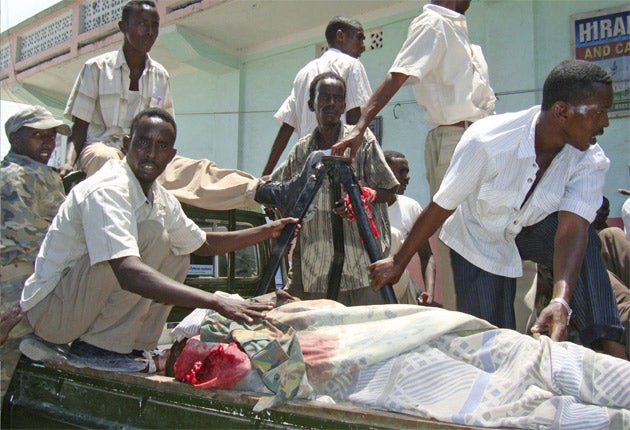Somali Islamists kill 33 in attack on government stronghold

Your support helps us to tell the story
From reproductive rights to climate change to Big Tech, The Independent is on the ground when the story is developing. Whether it's investigating the financials of Elon Musk's pro-Trump PAC or producing our latest documentary, 'The A Word', which shines a light on the American women fighting for reproductive rights, we know how important it is to parse out the facts from the messaging.
At such a critical moment in US history, we need reporters on the ground. Your donation allows us to keep sending journalists to speak to both sides of the story.
The Independent is trusted by Americans across the entire political spectrum. And unlike many other quality news outlets, we choose not to lock Americans out of our reporting and analysis with paywalls. We believe quality journalism should be available to everyone, paid for by those who can afford it.
Your support makes all the difference.The Islamist militant group al-Shabaab have stepped up their campaign to topple the government in Somalia, storming a hotel in the capital and killing at least 33 people, including six MPs.
Bodies were left strewn all over a seaside hotel, in a supposedly safer area of war-torn Mogadishu, after insurgents got past security by disguising themselves as police officers.
Witnesses including one parliamentarian described the scene at the Muna Hotel as a "massacre" with gunmen hunting guests from room to room, before blowing themselves up after security forces surrounded the building. The Information minister Abdirahman Osman said "the blood of the dead is leaking out of the hotel".
The worst attack of its kind since four ministers were murdered by a suicide bomber at a university graduation in February, it comes as Shabaab intensifies its campaign to oust the weak, UN-backed government. At least 74 people have been killed since heavy street fighting restarted on Monday. The government said the militants had ignored an appeal for a truce during Ramadan and condemned the attacks as "against Islam".
The hotel killings come after Shabaab threatened a "massive war" if the African Union (AU) goes ahead with plans to reinforce its 6,000-strong peacekeeping force in Mogadishu. Most of south and central Somalia is now controlled by a patchwork of extremist militant groups, of which Shabaab is by far is the strongest.
The transitional government, which nominally controls only a handful of streets in the capital, is wholly reliant on the AU force, made up of soldiers from Uganda and Burundi. Officials admit they would by overrun within hours by Shabaab if the peacekeepers were withdrawn.
The AU and its international backers have found themselves drawn into a test of strength with the Somali militants, who proved their ability to strike beyond the borders last month with twin bombings in the Ugandan capital. Some 77 people were slaughtered in suicide attacks at two Kampala evening spots as they watched the World Cup final, in an attack that Shabaab said was retaliation for the presence of Ugandan troops in Somalia. And despite millions of dollars in foreign support and arms shipments from Washington, the Somali government has been unable to establish any authority on the ground. Some regional analysts have argued for an end to all foreign interference in Somalia.
A spokesman for Shabaab said that yesterday's hotel assault had been carried out by "special forces" sent to kill those "aiding the infidels2.
One MP who survived the attack said she had been woken by the sound of gunshots. She said that guests on the upper floors had tried to escape by crawling out of windows. "Smoke filled my room after bullets smashed my window," she said. "I hid myself in a corner of the room. Then a guest next door came to my door, screaming 'Come out! Come out!' And when I came out bullets continued to fly around. I went back to my room and locked my door. Shortly afterward, the hotel staff asked me to come down and put me in a room at the second floor with four other survivors."
She had to pass the body of a fellow MP to get into the room, she added.
The fact that the massacre took place in Mogadishu's equivalent of the "green zone", a small government-controlled enclave on the waterfront, raises doubts over the UN plans to re-establish a mission in the capital.
For the past 16 years the UN, like most international agencies, has based its Somalia operations in neighbouring Kenya. Earlier this month they sprung a surprise by announcing that the Somalia mission would return to Mogadishu within 60 days as the new AU force was expected to improve the security situation.
Join our commenting forum
Join thought-provoking conversations, follow other Independent readers and see their replies
Comments